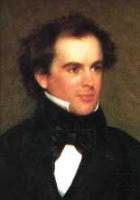Nathaniel Hawthorne
Nathaniel Hawthorne Poems
The ocean has its silent caves,
Deep, quiet and alone;
Though there be fury on the waves,
Beneath them there is none.
...
Oh, could I raise the darken'd veil
Which hides my future life from me,
Could unborn ages slowly sail
Before my view -- and could I see
...
Go to the grave where friends are laid,
And learn how quickly mortals fade,
...
How sweet the silver Moon's pale ray,
Falls trembling on the distant bay,
O'er which the breezes sigh no more,
...
Ye forms of Heroes slumb'ring here,
Beneath these tombstones cold and drear,
On which the moss of age has slept,
...
I left my low and humble home,
Far from my Father's fields to roam.
My peaceful cot no more had charms,
My only joy was War's alarms.
...
Oh, earthly pomp is but a dream,
And like a meteor's short-lived gleam;
And all the sons of glory soon
Will rest beneath the mould'ring stone.
...
Nathaniel Hawthorne Biography
Nathaniel Hawthorne (born Nathaniel Hathorne; July 4, 1804 – May 19, 1864) was an American novelist and short story writer. Nathaniel Hathorne was born in 1804 in the city of Salem, Massachusetts to Nathaniel Hathorne and Elizabeth Clarke Manning Hathorne. He later changed his name to "Hawthorne", adding a "w" to dissociate from relatives including John Hathorne, a judge during the Salem Witch Trials. Hawthorne attended Bowdoin College, was elected to Phi Beta Kappa in 1824, and graduated in 1825; his classmates included future president Franklin Pierce and future poet Henry Wadsworth Longfellow. Hawthorne anonymously published his first work, a novel titled Fanshawe, in 1828. He published several short stories in various periodicals which he collected in 1837 as Twice-Told Tales. The next year, he became engaged to Sophia Peabody. He worked at a Custom House and joined Brook Farm, a transcendentalist community, before marrying Peabody in 1842. The couple moved to The Old Manse in Concord, Massachusetts, later moving to Salem, the Berkshires, then to The Wayside in Concord. The Scarlet Letter was published in 1850, followed by a succession of other novels. A political appointment took Hawthorne and family to Europe before their return to The Wayside in 1860. Hawthorne died on May 19, 1864, leaving behind his wife and their three children. Much of Hawthorne's writing centers around New England, many works featuring moral allegories with a Puritan inspiration. His fiction works are considered part of the Romantic movement and, more specifically, dark romanticism. His themes often center on the inherent evil and sin of humanity, and his works often have moral messages and deep psychological complexity. His published works include novels, short stories, and a biography of his friend Franklin Pierce.)
The Best Poem Of Nathaniel Hawthorne
The Ocean
The ocean has its silent caves,
Deep, quiet and alone;
Though there be fury on the waves,
Beneath them there is none.
The awful spirits of the deep
Hold their communion there;
And there are those for whom we weep,
The young, the bright, the fair.
Calmly the wearied seamen rest
Beneath their own blue sea.
The ocean solitudes are blest,
For there is purity.
The earth has guilt, the earth has care,
Unquiet are its graves;
But peaceful sleep is ever there,
Beneath the dark blue waves.
Nathaniel Hawthorne Comments
Nathaniel Hawthorne Quotes
Is it a fact—or have I dreamt it—that, by means of electricity, the world of matter has become a great nerve, vibrating thousands of miles in a breathless point of time?
A woman's chastity consists, like an onion, of a series of coats.
We must not always talk in the market-place of what happens to us in the forest.
Nobody, I think, ought to read poetry, or look at pictures or statues, who cannot find a great deal more in them than the poet or artist has actually expressed. Their highest merit is suggestiveness.
Every young sculptor seems to think that he must give the world some specimen of indecorous womanhood, and call it Eve, Venus, a Nymph, or any name that may apologize for a lack of decent clothing.
We sometimes congratulate ourselves at the moment of waking from a troubled dream; it may be so the moment after death.
We sometimes congratulate ourselves at the moment of waking from a troubled dream; it may be so the moment after death.
The greatest obstacle to being heroic is the doubt whether one may not be going to prove one's self a fool; the truest heroism is to resist the doubt; and the profoundest wisdom, to know when it ought to be resisted, and when to be obeyed.
The greatest obstacle to being heroic is the doubt whether one may not be going to prove one's self a fool; the truest heroism is to resist the doubt; and the profoundest wisdom, to know when it ought to be resisted, and when to be obeyed.
My fortune somewhat resembled that of a person who should entertain an idea of committing suicide, and, altogether beyond his hopes, meet with the good hap to be murdered.
It contributes greatly towards a man's moral and intellectual health, to be brought into habits of companionship with individuals unlike himself, who care little for his pursuits, and whose sphere and abilities he must go out of himself to appreciate.
The world, that gray-bearded and wrinkled profligate, decrepit, without being venerable.
Man's own youth is the world's youth; at least he feels as if it were, and imagines that the earth's granite substance is something not yet hardened, and which he can mould into whatever shape he likes.
Nobody has any conscience about adding to the improbabilities of a marvelous tale.
On the breast of her gown, in fine red cloth, surrounded with an elaborate embroidery and fantastic flourishes of gold thread, appeared the letter A.
